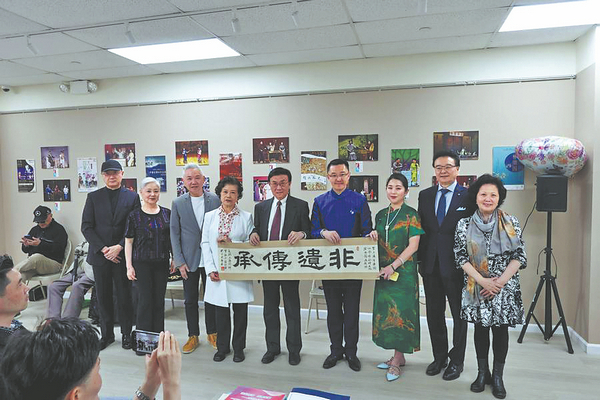


Members of the Shanghai Pingtan Troupe attend a community welcome event at the American Chinese Art & Culture Center in New York on May 8. LI XIRUI/XINHUA
NEW YORK — The winding alleys of China's ancient canal towns and the lyrical tones of the Wu dialect are making an appearance far beyond the Yangtze River Delta, resonating on the US stage and in the homes of Chinese American communities.
The traditional opera art of pingtan is taking center stage as the Shanghai Pingtan Troupe tours major US cities including Los Angeles, San Francisco, New York and Atlanta, with a special performance at the United Nations. The Graceful Jiangnan in Spring Breeze cultural exchange tour, which is running until Friday, is the troupe's second visit to the United States.
A traditional performing art that originated in Suzhou, Jiangsu province, over 400 years ago, pingtan blends storytelling, singing and dialogue. Typically performed in Suzhou dialect by two artists and accompanied by string instruments like the sanxian and the pipa, it is a hallmark of the culture of Jiangnan (the region south of the Yangtze River), and is celebrated for its poetic charm and literary depth.
Founded in 1951 and also known as the Shanghai Pingtan Art Heritage Institute, the Shanghai Pingtan Troupe is China's first national-level performing arts group dedicated to the art form, which gained urban prominence in the 1980s in Shanghai.
Through melodic narration and expressive delivery, pingtan conveys humor, drama and the cultural richness of Jiangnan's folk heritage.
"We didn't expect to tour again in the US this quickly," says Gao Bowen, the troupe's leader. The troupe first toured the US during the 2024 Spring Festival. "Our first visit was more of a trial run. This time, we've brought a richer program, with pingtan, Yueju Opera and Huaji (burlesque) Opera."
The troupe includes 10 national-level performers and inheritors of intangible cultural heritage.
"As the United Nations celebrates its 80th anniversary this year and China is one of the permanent members of the UN, we want to bring Chinese art and culture to the UN stage as part of the celebration," Gao says.
"At the same time, I hope pingtan will also reach Chinese communities here, bringing them authentic performances from home."
In New York, the troupe worked with local communities and organizations, performing for more than 200 attendees at the Flushing Town Hall and taking part in the "Echoes of Suzhou: The Art of Pingtan Returns" program at the China Institute. They also presented a photo exhibition of the history and cultural heritage of pingtan at the American Chinese Art & Culture Center in Flushing.

Artists from the troupe perform at the Flushing Town Hall in New York on Sunday. LI XIRUI/XINHUA
"The exhibition is special because it's not just about performances," Gao says.
"We've worked with local communities to create a historical showcase of pingtan, highlighting the founding artists of the Shanghai troupe, our predecessors, and how the art has developed with new productions and emerging talent.
"It presents over 70 years of history through images. I believe that after seeing it, visitors will gain a deeper understanding of pingtan, and of Shanghai's broader cultural legacy. It is more than just watching a performance. This is something truly meaningful."
Though pingtan was known as a popular pastime for the elderly, it has now become part of traditional lifestyle in Jiangnan, and Gao hopes to present it on a variety of stages to attract a wider audience. The troupe has made modifications to help the US audiences better understand the art form.
"Through our performances, we hope to offer audiences curious about and appreciative of traditional Chinese arts a direct and authentic experience," he says.
The performances are also aimed at overseas Chinese from the Yangtze River Delta region, who feel a deep emotional connection to the familiar dialects and melodies.
"We hope these performances will help them stay connected to their cultural roots. This is a tradition that continues to grow and evolve with each generation," Gao adds.
For the performance at the Flushing Town Hall, the team provided English subtitles.
"My ears were happy to hear it," says Brooklyn resident John Riess. "I've never attended anything like it. It was wonderful … the whole ambience and the gestures."
Shang Jiemin, the organizer of the event and president of the American Chinese Art & Culture Center, calls pingtan, Yueju Opera and Huaji Opera "cultural treasures from the Jiangsu and Zhejiang regions that are beloved by overseas Chinese communities".
"With its soft dialect and delicate expression, pingtan captures the poetic charm of our hometown," he says.
"We hope more regionally distinctive cultural programs will reach more global audiences and serve as bridges for cultural exchange."

